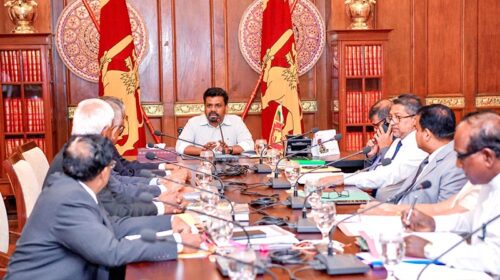 ECONOMYNEXT – Sri Lanka’s President Anura Dissanayake faces a range of key political risks and challenges, particularly given his position as the leader of the Marxist Janatha Vimukthi Peramuna (JVP)-led National People’s Power (NPP), a historically leftist alliance.
ECONOMYNEXT – Sri Lanka’s President Anura Dissanayake faces a range of key political risks and challenges, particularly given his position as the leader of the Marxist Janatha Vimukthi Peramuna (JVP)-led National People’s Power (NPP), a historically leftist alliance.
The NPP is tipped to win the November 14 parliamentary polls, but it is uncertain what number of seats it will gain in the 225-member legislature.
Dissanayake’s JVP has been involved in two insurrections in the past, while his broader NPP coalition is accused by rivals of having no experience in handling critical issues as a ruling party in the government.
Here is a detailed overview of the major political risks and policy dilemmas for Dissanayake’s government after forming an extended NPP government beyond the current three-member cabinet:
1. Economic Instability and IMF Engagement:
Sri Lanka’s economy remains fragile, and Dissanayake’s administration has to continue managing the terms of the International Monetary Fund bailout package initiated by the previous center-right government. While the NPP pledged to renegotiate certain terms, balancing economic reforms with domestic economic protectionism and socialist policies may prove contentious. So far, Dissanayake’s 50-day “transition” government has maintained the status quo on the IMF deal, contrary to NPP’s hard stance to renegotiate and change the debt sustainability analysis (DSA). The DSA is a strategy Sri Lanka agreed with the global lender to achieve sustainable debt repayment and come out of its 2022 sovereign debt default.
Factors to watch:
- Changes in the new government’s tax policies
- New government’s revenue proposals
- Delay in the third IMF review and 4th tranche disbursement
- Delay in receiving some World Bank, ADB funds due to delay in IMF deal
2. Debt Management and Public Finances:
The country’s external debt restructuring is ongoing, with a precarious fiscal position requiring careful navigation. The NPP is compelled to maintain creditor confidence while addressing domestic demands for economic justice, including attempts to recover assets from foreign countries linked to corruption, which is likely to take years contrary to people’s expectations.
Factors to watch:
- Debt restructuring deal with sovereign bond holders
- Court ruling on a case filed by Hamilton Reserve Bank against default
- Impact in debt restructuring due to delay in IMF disbursements
- Impacts on local banking/financial sector due to debt restructuring
3. Social Inequality and Populist Promises:
Dissanayake campaigned on anti-corruption and systemic change, reflecting dissatisfaction with political elites. Delivering on these promises, especially in the context of past protests by his party-linked trade unions and public expectations, will be challenging without jeopardizing the country’s fragile economic stability. Most voters elected Dissanayake for his promise to address corruption. Analysts, however, say that change needs a holistic approach and not just arresting and punishing political leaders who are accused of corruption and impunity.
Factors to watch:
- Ensuring justice in some key past court cases dragged for years, including Easter Sunday attack, Central Bank bond scam, and misuse of public funds
- Impacts on new government’s popularity due to possible delays in some court cases
- Protests by rival parties as NPP did when it was in the opposition
- New measures to prevent corruption in future
4. Geopolitical Balancing Act:
The NPP’s ideological roots include a traditionally adversarial stance toward India and an inclination toward China and Russia. Dissanayake has sought to moderate these positions for pragmatic diplomacy, but skepticism remains around potential reversals on sensitive projects, such as those involving Indian and Chinese investments. Before his election, his party promised to abolish a key Indian renewable power project in Northern Sri Lanka. However, Dissanayake’s party has backpaddled and said it will review India’s Adani project and renegotiate in January. So far Dissanayake has not strongly antagonized the New Delhi government. However, most party cadres of JVP led by Dissanayake have strong anti-India sentiments. They have been critical against Indian projects including Trincomalee Oil Tank farm project in the past. In addition to India and China, Dissanayake also has to manage better relations with the US, Russia, Japan, and EU nations. These relationships are crucial for Sri Lanka to come out of the current economic crisis and sovereign debt default.
Factors to watch:
- Satisfying Indian demands including Adani, connectivity projects
- Dealing with China and Russia
- Dealing with the West including the US for investments, grants
- Neutralizing some deals with foreign nations that are adverse to Sri Lanka
5. Inexperience and Legislative Control:
As the NPP has not previously governed, the lack of administrative experience poses a challenge. Furthermore, Dissanayake’s ability to enact reforms will be complicated if he fails to secure a stable parliamentary majority in the November 14 polls. Some of his appointments have already angered bureaucrats who say the new government has gone against the NPP’s promise of appointment based on meritocracy. It also does not have enough clean and corruption-free experts to negotiate international deals like IMF loan, debt restructuring, and energy deals. Such lack of expertise could make Dissanayake’s future government vulnerable to agree on less than what Sri Lanka should get in key international deals, analysts say.
Factors to watch:
- Negotiations with IMF, commercial debtors, China, and India
- Backing by Bureaucrats in future
- Key appointments to Ministries and key state-owned enterprises
- Reducing government expenditure without privatization
6. Public and Private Sector Expectations:
Dissanayake’s campaign included efforts to engage both grassroots and business interests, including support for domestic industry. However, maintaining this balancing act while satisfying private-sector concerns about market interventions will be demanding.
Factors to watch:
- Tax reduction, new taxes on the public, private firms
- Policies to boost small and medium enterprises (SMEs)
- Policies on state sector recruitment
- Investment policies
7. Political Reforms and Governance Structures: Dissanayake aims to abolish Sri Lanka’s controversial executive presidency, but constitutional amendments require broad support. Achieving consensus across a diverse and divided political landscape could be difficult.
Factors to watch:
- Strength of the parliament majority
- Support he gets from other parties in the parliament
- Possible conflict between NPP and hardcore JVP members
- Relationship with former leaders who are still influential
(Colombo/November 13/2024)
https://economynext.com/explainer-sri-lankas-key-political-risks-after-parliamentary-elections-187149/
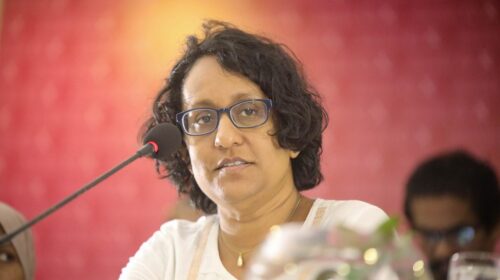 Constitutional reform has been a consistent demand of the citizens of Sri Lanka, most of whom firmly oppose an all-powerful president who is free of the checks and balances imposed by a strong parliament. Successive presidents have pledged to abolish the executive presidency only to renege on that promise once they were elected to power. However, since the presidential system was introduced by J.R. Jayewardene in 1978, it has consistently failed to deliver the political stability, economic prosperity and stable peace that the it was supposedly designed to produce.
Constitutional reform has been a consistent demand of the citizens of Sri Lanka, most of whom firmly oppose an all-powerful president who is free of the checks and balances imposed by a strong parliament. Successive presidents have pledged to abolish the executive presidency only to renege on that promise once they were elected to power. However, since the presidential system was introduced by J.R. Jayewardene in 1978, it has consistently failed to deliver the political stability, economic prosperity and stable peace that the it was supposedly designed to produce.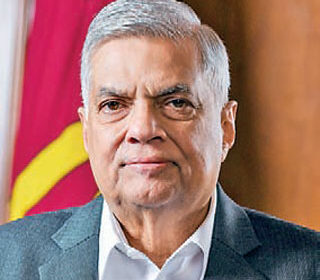 Opposition politicians and some of their government counterparts have taken up the cudgels for the people’s franchise following UNP General Secretary Palitha Range Bandara’s call for postponing the next presidential and parliamentary polls by two years. They say they are ready to do all it takes to prevent the postponement of elections.
Opposition politicians and some of their government counterparts have taken up the cudgels for the people’s franchise following UNP General Secretary Palitha Range Bandara’s call for postponing the next presidential and parliamentary polls by two years. They say they are ready to do all it takes to prevent the postponement of elections.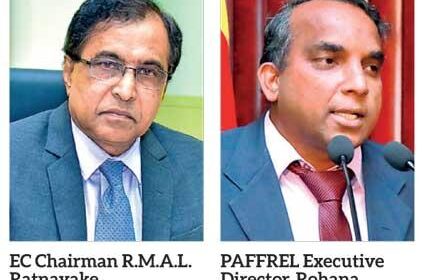 What is the significance of the Election Commission’s (EC) announcement on Thursday that the next presidential election would be held between September 17 and October 16? It is a well-known fact to those who know the relevant Article of the Constitution. It would have only been relevant if the EC had announced the exact date for the election.
What is the significance of the Election Commission’s (EC) announcement on Thursday that the next presidential election would be held between September 17 and October 16? It is a well-known fact to those who know the relevant Article of the Constitution. It would have only been relevant if the EC had announced the exact date for the election.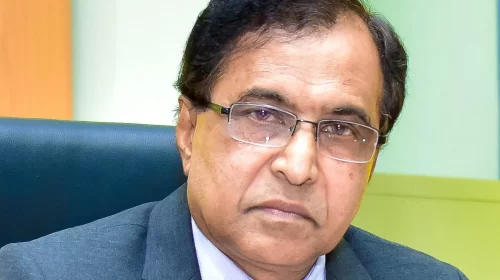 The Election Commission (EC) has informed President’s Secretary Saman Ekanayake and the other relevant authorities that it is better to hold the Local Government (LG) elections than establishing community advisory committees to oversee development projects under LG bodies.
The Election Commission (EC) has informed President’s Secretary Saman Ekanayake and the other relevant authorities that it is better to hold the Local Government (LG) elections than establishing community advisory committees to oversee development projects under LG bodies.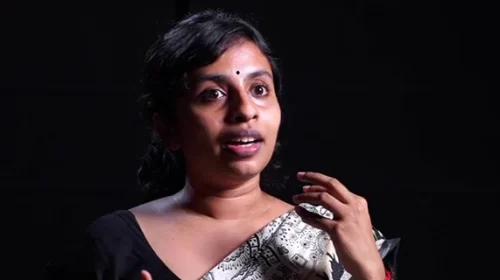 In a landscape fraught with tension, a clash has emerged between the Public Security Minister Tiran Alles and the Bar Association of Sri Lanka (BASL) over the controversial ‘Yukthiya’ (Justice) anti-drug and anti-organised crime operation.
In a landscape fraught with tension, a clash has emerged between the Public Security Minister Tiran Alles and the Bar Association of Sri Lanka (BASL) over the controversial ‘Yukthiya’ (Justice) anti-drug and anti-organised crime operation. 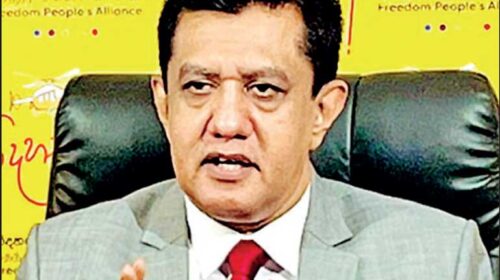 Freedom People’s Congress (FPC) member and parliamentarian Prof. Charitha Herath issued a warning yesterday, expressing concern about an impending constitutional crisis in the country.
Freedom People’s Congress (FPC) member and parliamentarian Prof. Charitha Herath issued a warning yesterday, expressing concern about an impending constitutional crisis in the country.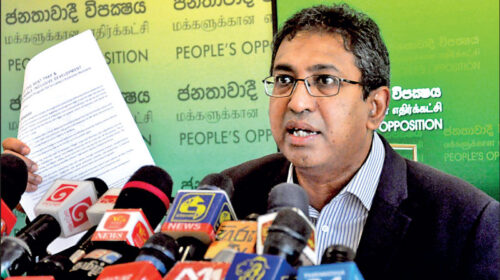 Ina compelling address toParliament, main Opposition Samagi Jana Balawegaya (SJB) MP Dr. Harsha de Silva delivered a comprehensive critique of Budget 2024, shedding light on critical issues that demand urgent attention.
Ina compelling address toParliament, main Opposition Samagi Jana Balawegaya (SJB) MP Dr. Harsha de Silva delivered a comprehensive critique of Budget 2024, shedding light on critical issues that demand urgent attention.